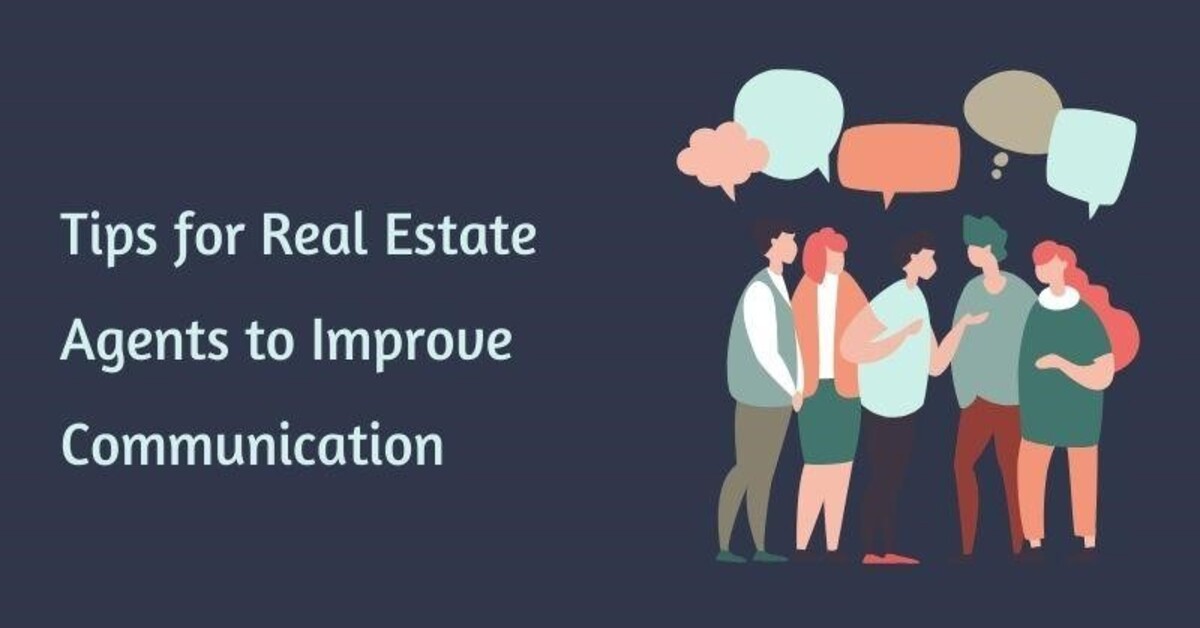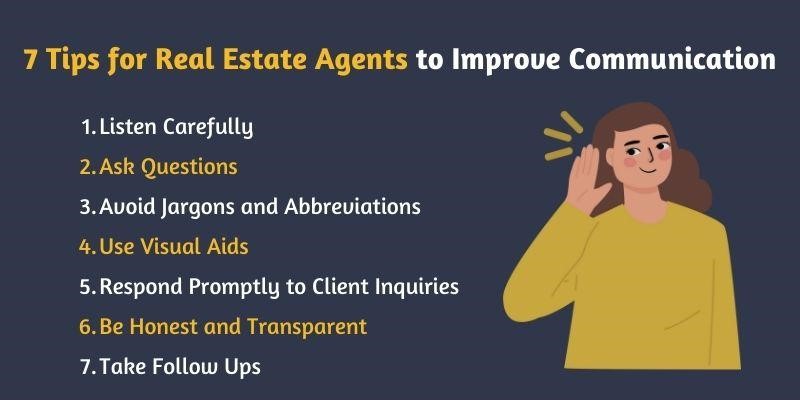Communication is crucial in establishing a connection with your colleagues and customers. Effective communication is necessary for real estate professionals as it can help them easily share ideas, understand client’s needs, and collaborate with other professionals.
When succeeding in the competitive real estate industry, you should improve and enhance your communication skills.
A well-communicating agent holds a powerful position in negotiations. The ability to articulate and negotiate terms, conditions, and prices persuasively can be a game-changer in closing successful deals.
Clear and open communication also builds client rapport, fostering long-term connections and referrals.
Considering the importance of this skill, we are sharing practical tips for real estate agents to improve communication. These tips will help you become a better professional and deal with your clientele quickly.
Furthermore, these tips can also help you deal with everyday challenges associated with clear communication. So, let’s start exploring these practical and helpful tips!
Top 7 Tips for Real Estate Agents to Improve Communication
Effective communication is the basis of success in the real estate industry. Let’s explore seven invaluable tips to enhance your communication skills as a real estate agent.
1. Listen Carefully
Effective communication in real estate isn’t just about conveying information; it also includes active listening.
Listening carefully means going beyond the surface of spoken words. Understanding your client’s needs, concerns, and aspirations is crucial as a real estate agent.
It’s about paying attention to what and how it’s said. This skill lets you grasp the unspoken, building a deeper connection and trust with your clients.
Moreover, by actively listening, you demonstrate genuine interest and respect for your clients. This, in turn, creates a positive and collaborative atmosphere essential for successful real estate transactions.
2. Ask Questions
Asking questions is another fundamental aspect of effective communication in real estate. While listening provides insights, asking questions allows you to clarify and delve deeper into clients’ preferences and expectations.
Thoughtful and open-ended questions encourage clients to express their thoughts, enabling you to tailor your services to their needs.
Asking questions also demonstrates your commitment to understanding your clients profoundly. It shows that you are not merely there to sell or list properties but to provide a personalized and valuable service.
This interactive communication style helps build rapport, making clients feel heard, understood, and well-supported throughout the real estate process.
3. Avoid Jargon and Abbreviations
Communicating with clarity and transparency is essential for every real estate transaction. One common challenge to overcome is the use of industry jargon and abbreviations.
While these terms might be second nature to a real estate professional such as an auctioneer and broker, they can be confusing and overwhelming for clients not immersed in the field.
Using jargon may create a communication barrier, making clients feel detached or misunderstood.
It’s essential to communicate in a language that is accessible and relatable to your clients. This fosters a more comfortable and collaborative relationship and empowers clients to make informed decisions.
Effective communication is about bridging gaps; avoiding jargon is a simple yet impactful way to achieve this.
4. Use Visual Aids
Incorporating visual aids into your communication strategy can significantly enhance your effectiveness as a real estate agent.
Visual aids, such as graphs, charts, and diagrams, can simplify complex information, making it easy to understand for clients.
When explaining market trends, property values, or investment potential, a well-crafted visual can speak volumes and ensure your clients grasp the key points.
Moreover, when showcasing properties, use the power of visual aids through photographs and videos. A picture is worth a thousand words, and in real estate, it can be the key to capturing your clients’ interest and imagination.
Visual aids make your presentations more engaging and cater to different learning styles, ensuring your message resonates effectively with a diverse audience.
5. Respond Promptly to Client Inquiries
Responsiveness or timely response is the foundation of effective communication. Responding promptly to client inquiries demonstrates not only your professionalism but also your commitment to their needs.
Being available to answer questions and provide up-to-date information is a proactive approach to client satisfaction. It’s not just about speed but also accuracy.
Ensure that the information you provide is current and reliable, generating confidence in your clients.
Whether clarifying details about a property, discussing market trends, or addressing concerns, a prompt and accurate response sets the tone for a positive client-agent relationship.
6. Be Honest and Transparent
Honesty and transparency are the basis of trust in any professional relationship. In the real estate industry, they are non-negotiable.
Real estate agents must be transparent and honest about their properties, disclosing positive attributes and any issues that might impact the buying or selling process.
Transparency should extend to the entire real estate transaction process. Clients should be equipped with all the necessary information to make informed decisions. This includes being candid about the buying or selling process, potential challenges, and the realistic timeline.
An open line of communication, rooted in honesty and transparency, builds trust and positions you as a reliable and ethical real estate professional.
7. Take Follow Ups
Taking follow-ups is a strategic move that fosters lasting relationships and ensures client satisfaction. Effective follow-up practices can significantly impact the client’s experience in buying and selling property.
Following up after a property viewing is critical in understanding the client’s perspective. It provides an opportunity to gather feedback, address concerns, and offer further clarification.
This process is not just about post-viewing formalities; it’s about showing genuine interest in the client’s needs and concerns.
A thoughtful follow-up can uncover valuable insights, helping you tailor your approach to serve their specific requirements better. Consistent follow-ups also reinforce your commitment to client satisfaction.
Conclusion
Effective communication is the foundation of successful transactions in the natural sector arena. It strengthens the connection and trust between clients and real estate professionals.
In a client’s case, it helps them make a financial decision after considering the actual value and characteristics of a property. If accurate facts are communicated with the client, it helps them value the real estate professional for their honesty.
Additionally, clear and effective communication can help real estate professionals create a persona of an honest individual, enhancing their credibility in the real estate sector.
Considering the benefits of communication, we share practical tips for real Estate agents to improve communication. We hope you will utilize these tips to become a successful real estate agent.
For real estate professionals looking to improve their communication skills and elevate their expertise, ThinkProp’s real estate training programs offer invaluable insights and practical knowledge. Our programs are designed to empower agents with the tools needed to navigate the dynamic real estate landscape successfully.
Whether you are a seasoned professional or just starting in the industry, seeking professional guidance can make a remarkable difference in your career!







